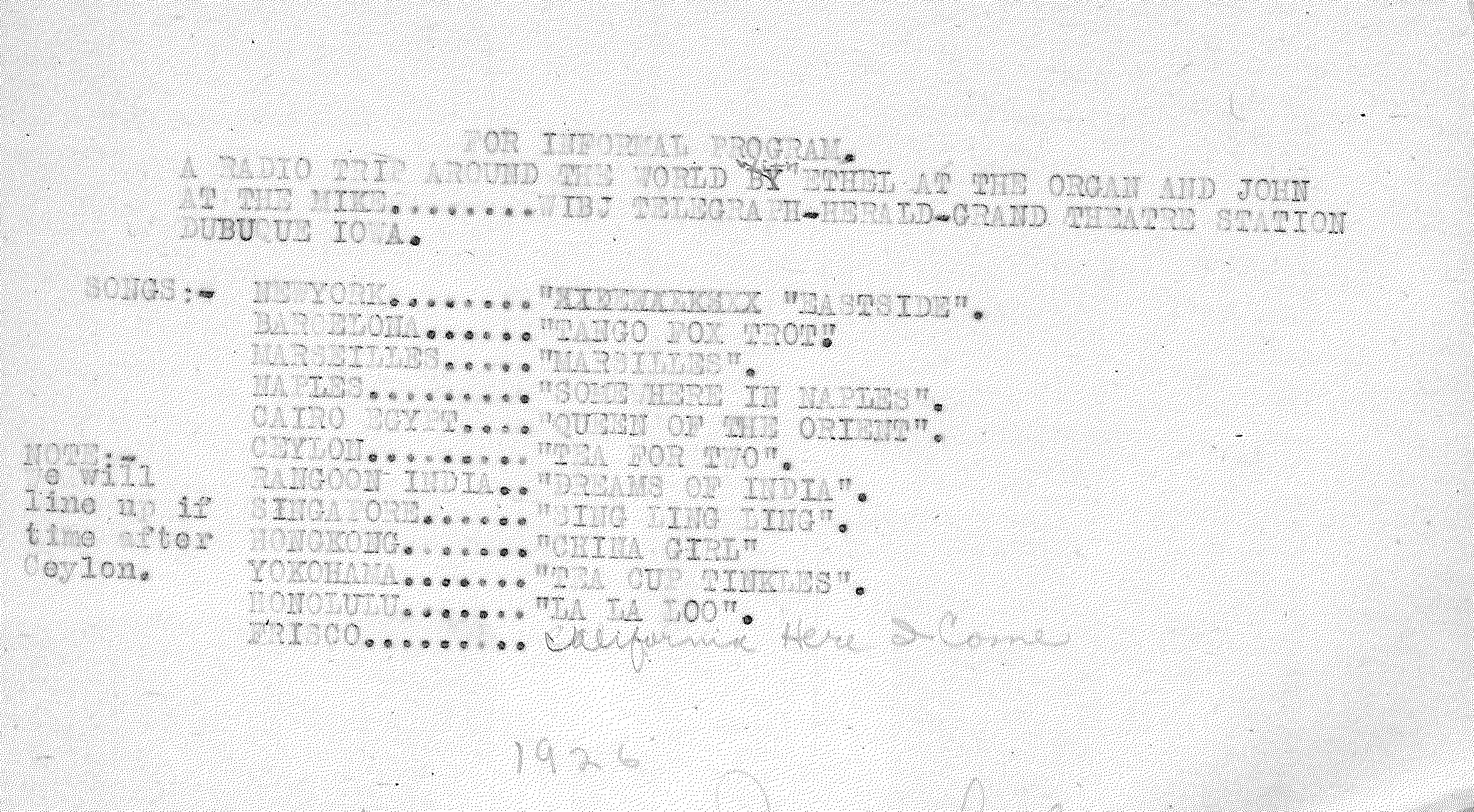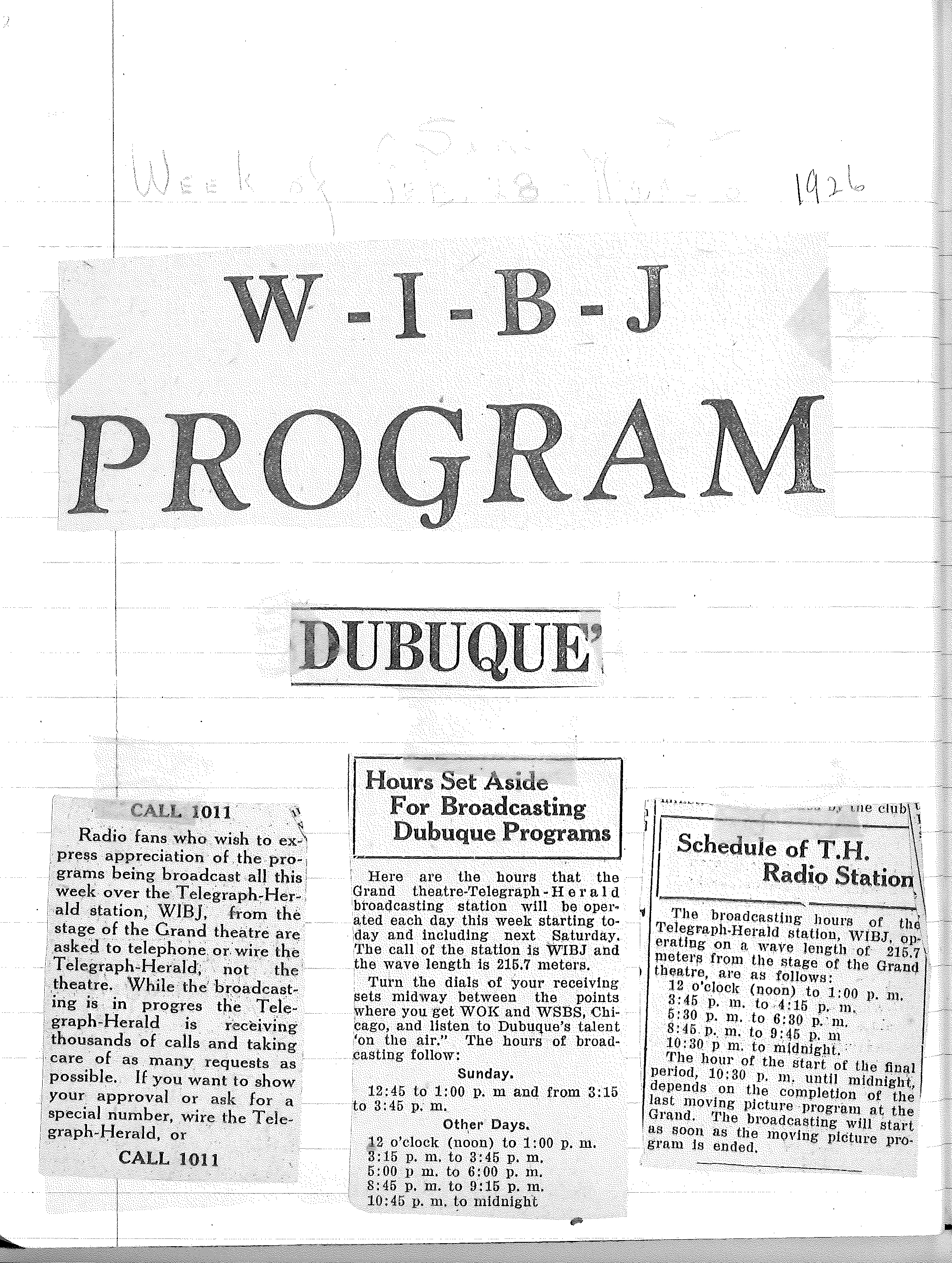Encyclopedia Dubuque
"Encyclopedia Dubuque is the online authority for all things Dubuque, written by the people who know the city best.”
Marshall Cohen—researcher and producer, CNN
Affiliated with the Local History Network of the State Historical Society of Iowa, and the Iowa Museum Association.
WIBJ
WIBJ. One of the early RADIO stations in Dubuque, WIBJ, sponsored by the TELEGRAPH HERALD operated for one week from the GRAND OPERA HOUSE. When it signed off with a simple "Goodbye" on March 7, 1926 a week of unique entertainment was brought to an end leaving listeners wanting more.
The station was brought to Dubuque by the management of the Grand, the Telegraph Herald, and the management of several Dubuque companies including MCFADDEN COFFEE AND SPICE COMPANY, JACKSON VINEGAR COMPANY, IOWA OIL COMPANY (IOCO), KASSLER MOTOR COMPANY, APPEL-HIGLEY ELECTRIC SHOP, RENIER MUSIC HOUSE, and the J. F. STAMPFER COMPANY. (1) The station began broadcasting at 12:45 p.m. on February 28, 1926 with the announcer saying," This is Station WIBJ, operated by the Telegraph Herald, Dubuque, Iowa broadcasting from the state of the Grand Theatre in Dubuque, Iowa. An address by Mayor James ALDERSON followed with an appeal for a county form of government similar to the city manager form. (2) This was followed by an organ recital by Ethel Gassman. The station went on the air again at 3:45 with a live audience and new musical numbers. The evening program began at 8:45 p.m. (3)
Broadcasting resumed at noon, March 1st. An address on health by Dr. D. C. Steelsmith, city and county health director was followed by music. Other musical performances occurred during the 5:30-6:30 p.m. broadcasts. Evening broadcasts were made between 8:45-9:45 p.m. and 10:30-midnight. These featured the Harmony Boys' Orchestra; Grace Avery, vocal soloist; Mrs. Gingras Beversdorf, vocalist; Mrs. Appel, vocalist; Rakph Lassance, vocalist; and Grand Theatre Orchestra.
The schedule of noon, afternoon, and two evening programs continued throughout the week. The week-long programming gave listeners an opportunity to enjoy. Those willing to visit the Grand witnessed how broadcasting was done as it was carried out on the stage in full view of the audience. (4)
The noon hour program on Friday featured piano duet selections by Ethel Gassman, the organist at the Grand, and Horteuse Platt, pianist. Beatrice Connolly sang requested songs and Al Heer, an employee of the JULIEN HOTEL performed solos. (5)
The 8:45 p.m.-9:45 p.m. Friday evening program, sponsored by the J. J. Stampfer Company, began with several selection of the DUBUQUE HIGH SCHOOL band. They were followed by the Radio State Quartet and the J. F. Stampfer Company quartet. Listeners then heard D. J. Wallis and John T. Neu, old time fiddlers, and the program closed with selections by an orchestra led by Ralph Abbatto, harpist. The second Friday evening program from 10:30 p.m.-midnight opened by selections sung by the male choir of ST. RAPHAEL'S CATHEDRAL. These were followed by solos by Elsy Hoefflin, pianist and George Saffran, vocalist. McPartland's nine piece orchestra from COLUMBIA COLLEGE performed next. At midnight, Clem Boland's Orchestra and Don and His Ragtime Pals, played request numbers as did Ethel Gassman and Elsy Hoefflin. The program lasted until late the next morning. (6)
Other local talent performing during the week included a harmonic quartet from the DUBUQUE BOYS' CLUB; Harold Collins, pianist; Irving Burt, pianist; Ludwina Jungferman, vocalist; Dubuque Fireman's Band; Clifford Avery and his Orchestra; Mabel Rich Cottingham and Professor Franz Otto, operatic selections; Oxus Grotto Band; Ben Richards, accordian; Conn's Melody Monarchs; and Vincent CHEWNING and his WIBJ Orchestra. (6)
The public response to the broadcasting was beyond expectations. Additional operators had to be hired at the Telegraph-Herald and Grand to handle those who called 1011 to offer comments or make requests. (7)
On Sunday, March 7, 1926 the station was to be dismantled and transported to other city in the Midwest with broadcasts of local talent. (8) It was actually transferred from the Grand to the Telegraph Herald building. Joe Enzler and his Troubadors made a broadcast from 7:30 p.m. to 11:00 p.m. (9)
---
Source:
1. "Dubuque Station WIBJ Says Goodbye," Telegraph-Herald, March 7, 1926, p. 24
2. "Thousands Hear Station WIBJ," Telegraph-Herald, March 1, 1926, p. 2
3. Ibid.
4. "Dubuque Station WIBJ..."
5. Ibid.
6. Ibid.
7. Ibid.
8. "Dubuque Station WIBJ..."
9. "Musical Program From WIBJ Tonight," Telegraph-Herald, March 8, 1926, p. 12



